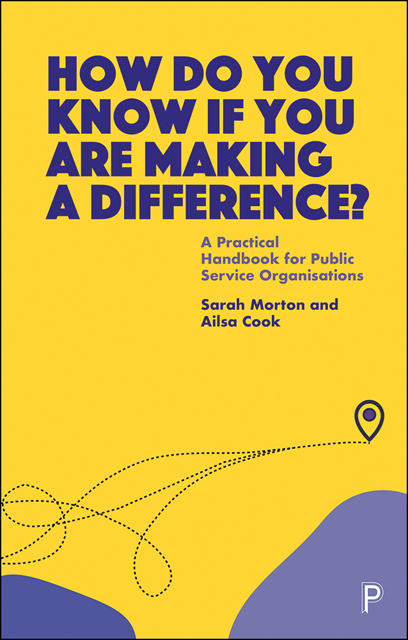 How Do You Know If You Are Making a Difference?
How Do You Know If You Are Making a Difference? Book contents
- Frontmatter
- Dedication
- Contents
- List of figures and tables
- Acknowledgements
- Preface
- 1 Why is it so hard to know if you are making a difference?
- 2 Why complexity thinking can help you understand public services
- 3 What data and evidence do you need to see what difference you are making?
- 4 Embrace the complex contex
- 5 Embrace the complex context
- 6 Clarify the change you want to see
- 7 Get going on your data, evidence and feedback improvement journey
- 8 Tracking progress towards outcomes and impacts
- 9 Telling the story of the difference your work makes
- 10 Using this approach in different contexts and sectors
- 11 Becoming an outcome- and impact-focused organisation
- References
- Index
7 - Get going on your data, evidence and feedback improvement journey
Published online by Cambridge University Press: 20 June 2023
- Frontmatter
- Dedication
- Contents
- List of figures and tables
- Acknowledgements
- Preface
- 1 Why is it so hard to know if you are making a difference?
- 2 Why complexity thinking can help you understand public services
- 3 What data and evidence do you need to see what difference you are making?
- 4 Embrace the complex contex
- 5 Embrace the complex context
- 6 Clarify the change you want to see
- 7 Get going on your data, evidence and feedback improvement journey
- 8 Tracking progress towards outcomes and impacts
- 9 Telling the story of the difference your work makes
- 10 Using this approach in different contexts and sectors
- 11 Becoming an outcome- and impact-focused organisation
- References
- Index
Summary
Wouldn’t it be amazing to have all of the data and information at your fingertips to understand the change you want to see in the world? When so much data is available, and ways of collecting data have become more streamlined, it can be exasperating not to be able to pull together what is needed for the practical job of understanding whether something is making the difference intended.
We have already outlined why trying to understand complex work is difficult, and that using data is not a technical-rational process but rather a relational one – where the process of sense making together can be as important as the data, evidence or feedback you use.
In Chapter 3 we discussed challenges in the culture and in the ways of working with data for most organisations. We suggested the need to go on a data improvement journey. In this chapter we present some practical ways to approach the journey, and tools and techniques to help on the way.
This chapter covers:
• improving approaches to data, evidence and feedback;
• how to undertake a data audit;
• how to fill the gaps understanding;
• practical data collection techniques;
• feedback in action.
We will be using examples from some of our clients, including how a research body improved feedback, ways of building on reflective practice, and getting feedback fast.
We hope you will be able to use some of the ideas presented here and apply them to any setting, share them with colleagues and start on a data improvement journey. The message is the same as in Chapter 4 – just get going with your data improvement journey!
A quick reminder of what we mean when we talk about data, evidence and feedback:
Data: any quantitative, numerical or qualitative collected information about what an initiative is doing and what difference it makes.
Evidence: more formal and processed information such as evaluation reports (for the work in question or from other similar work) or the research evidence – for example, systematic reviews or research that relates to the themes of the work. ‘Evidence’ can also be used informally as a term to refer to all of the above.
- Type
- Chapter
- Information
- How Do You Know If You Are Making a Difference?A Practical Handbook for Public Service Organisations, pp. 101 - 120Publisher: Bristol University PressPrint publication year: 2022


